As we continue to ponder the core of responsible rationality, it is helpful to ponder a summary of what we have won:
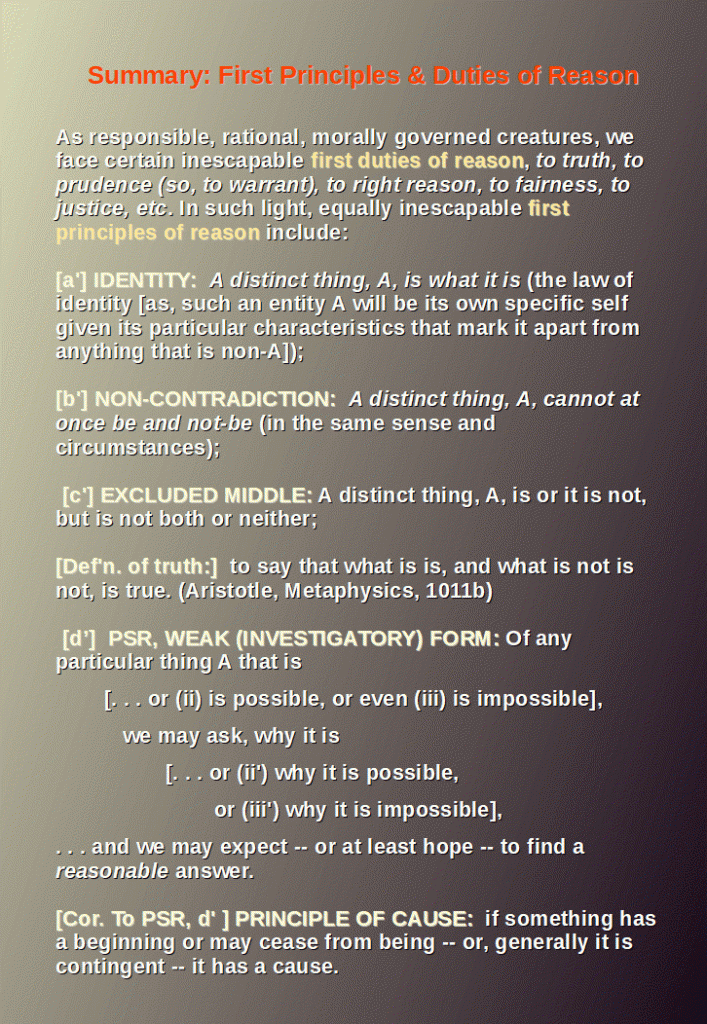
I recall, way back, being taught how the seventeen first equations of Boolean Algebra [which can all be verified as equivalence relations through truth tables] were of equally axiomatic status. But then, I got the logic of being infection, and began to see that in fact, from the ontological perspective, identity and its close corollaries are prior:
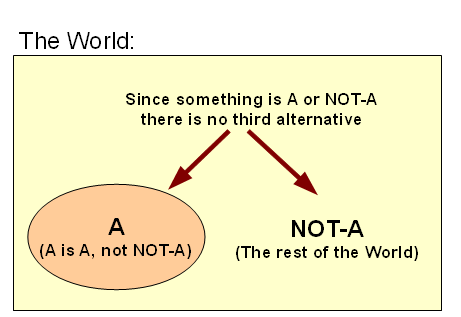
Then, there was that old philosopher who said that truth says of what is, that it is; and of what is not, that it is not. Sometimes, the truth does fit in a nutshell. Here, that truth accurately describes reality. That is, propositions — what sentences assert regarding reality — in certain cases hit the mark. Of course, in other cases, while the intent is there, performance is not.
Consequently, one of the first undeniably true claims is the Josiah Royce proposition, E: error exists. Obviously, this is general consensus and readily observed (think, red X’s on elementary school sums gone awry), but it is also stronger than that.
Imagine someone asserting Not-E, ~E — and yes, we likely can find such persons out there.
That person would immediately imply that E is in error; i.e. the very attempt to deny lands in confirming truth. This case being immediately apparent as a reduction to the absurd. Thus, we find a case of self-evident truth. Truth that is evident from understanding what is claimed (in light of adequate background experience that enables understanding) and which is so on patent absurdity if a denial is attempted. Of course, there are different sorts of absurdity (not just logical self-contradiction), thus different forms of self-evidence.
Allow me to add an illustration (inescapable truth), following Epictetus:
EPICTETUS
DISCOURSES
CHAPTER XXV
How is logic necessary?
When someone in [Epictetus’] audience said, Convince me that logic is necessary, he answered: Do you wish me to demonstrate this to you?—Yes.—Well, then, must I use a demonstrative argument?—And when the questioner had agreed to that, Epictetus asked him. How, then, will you know if I impose upon you?—As the man had no answer to give, Epictetus said: Do you see how you yourself admit that all this instruction is necessary, if, without it, you cannot so much as know whether it is necessary or not? [Cf J. C. Wright]
Now, these results carry with them already, a world of consequences. For, here we have truth, undeniable truth that accurately describes what must obtain in any possible world. The truth, error exists, is a consensus and is empirically observable. It is also logically necessary. It is warranted, credibly true (and so, reliable) while being believed; it is objective knowledge. Indeed, it is undeniably certain knowledge, a point of absolute, known, knowable truth.
Thus, immediately, radical subjectivism, emotivism and relativism fail, bringing down with them a large swath of current thought, ideology and cultural agendas that pivot on such.
We can add a train of thought that breaks truth out of being strictly empirical. Consider a possible world W, to be distinguished from a close neighbour W’ by some feature or aspect A. We then partition — dichotomise — W as W = {A|~A}, where ~A id the complement to A in W, in effect ~A = W – A. The partition, |, is empty, i.e. nullity emerges. A is a unit and ~A a complex unit. Further, these, together show duality. We thus see inherent abstracta, the numbers 0, 1, 2 in action. Extending via von Neumann:
{} –> 0
{0} –> 1
{0,1} –> 2
{0,1,2} –> 3
. . .
{0,1,2,3 . . . } –> omega
. . . and we have the natural counting numbers and a first transfinite successor ordinal, omega. Thus, we may proceed to the integers by positing that for any natural n we have (-n) such that n + (-n) = 0; this gives us vectors on one axis, as direction is added to size. Then, we define Q the rationals as m/n, thence the reals R as numbers such as pi or sqrt-2 etc requiring infinite sums of power series to specify. Similarly, we may identify complex numbers C by using i* as a 90 degree anticlickwise rotation operator so i*x defines another line of numbers pivoting on 0. However as i*i*x = -x, we then see that i^2 = -1, i is sqrt-(-1). We thus have a core of abstract structure and quantity, the heart of Mathematics.
Abstracta can be as real as concrete physical phenomena. Something, that cuts another huge swath across the space of currently fashionable worldviews and cultural agendas.
Going further, we encounter the mysterious PSR in a weak investigatory form: the principle of sufficient reason. Consider a candidate to be, X. We may freely ask about its logic of being status:
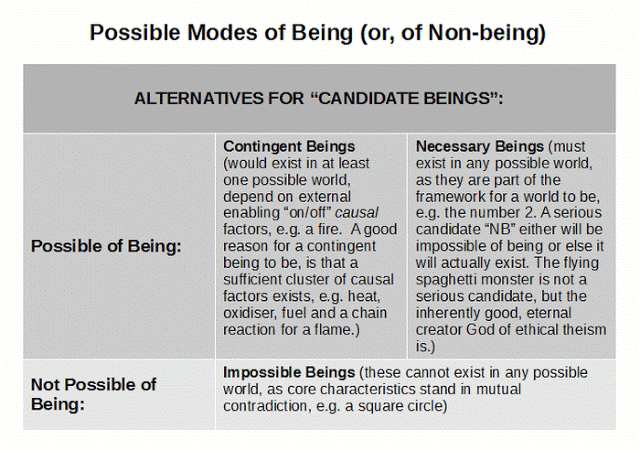
That leads us to ponder causality, e.g. the effect of necessary, enabling factors for a fire:
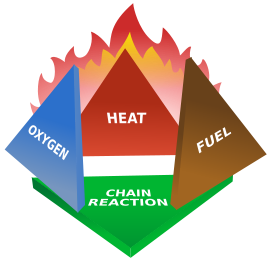 Public domain
Public domainThus, we are equipped to ponder contingent vs necessary beings and to examine how they are such.
Okay, nice logic-101 so far; of what relevance?
The answer lies in the implications for our civilisation and our need for reform. The above exposes fatal cracks in dominant ideologies, cultural assumptions and agendas, pointing to needed correction. For, in making man the measure of all things, we have set up crooked yardsticsks as standards of straight, upright, accurate. We need naturally straight and upright plumblines:

The question is, will we even heed the voice of the plumbline? END
F/N: It seems helpful to add an infographic on Schaeffer’s critique of how the West’s intellectual tradition has evolved over the past 800 years, as modified. First, theinjection of the principle of the house divided (now manifest in say the facts vs values dichotomy or the inheritance of Kant’s ugly gulch between the inner world and the external one of things in themselves etc) :

Next, the 800 year breakdown:
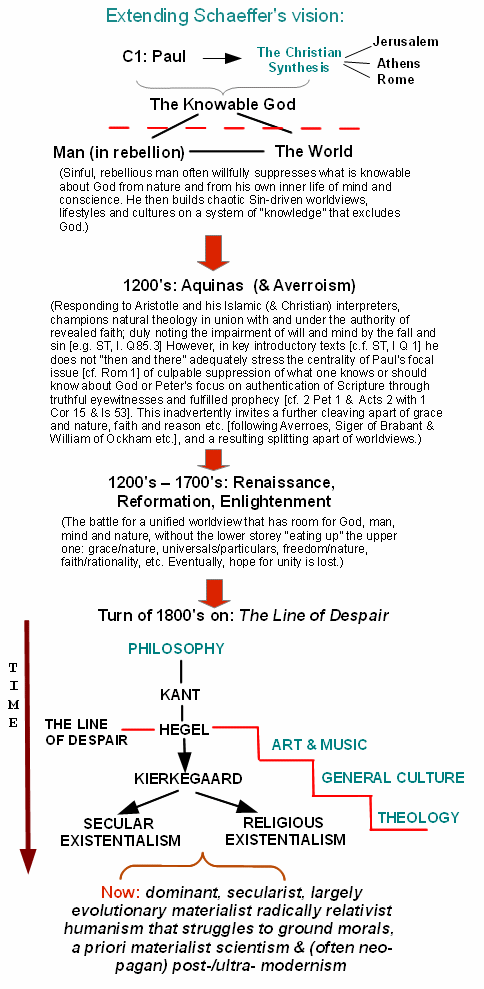
From this, we come to the way we warp our institutions to erect and support the protective roof of a dominant but dubious worldview and cultural agenda (which are unsustainable but protect the dominant elites for now):
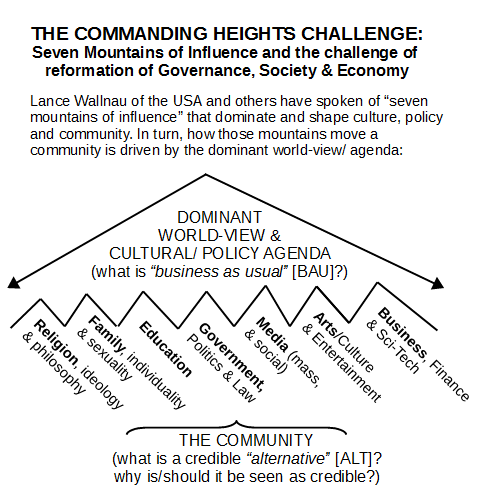
This then raises the challenge of breakthrough, prophetic, intellectual and cultural leadership if we are to break out of our present en-darkened age and escape a voyage of folly:
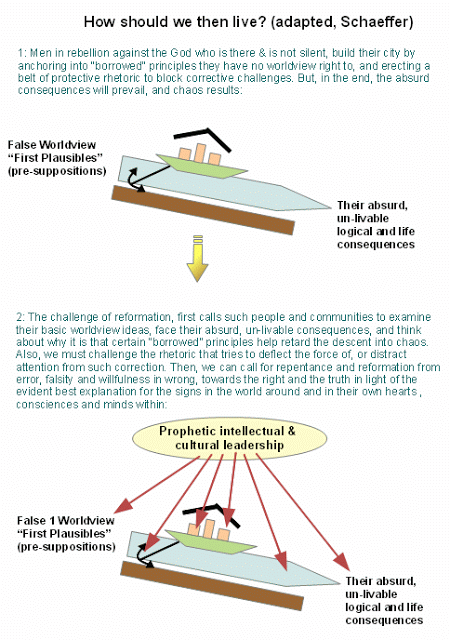
That, is the kairos which now confronts us.